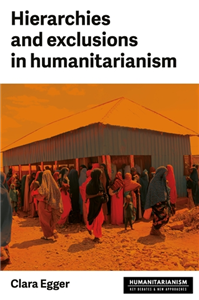Hierarchies and exclusion in humanitarianism
by Clara Egger, Andrea Schneiker
Description
More Information
Rights Information
Albania, Algeria, Angola, Argentina, Armenia, Australia, Austria, Bahrain, Belgium, Belize, Benin, Bolivia, Bosnia and Herzegovina, Botswana, Brazil, Bulgaria, Burkina Faso, Burundi, Cameroon, Canada, Cape Verde, Central African Republic, Chad, Chile, China, Colombia, Comoros, Congo [DRC], Congo, Republic of the, Costa Rica, Ivory Coast, Croatia, Czech Republic, Denmark, Djibouti, Ecuador, Egypt, El Salvador, Equatorial Guinea, Eritrea, Estonia, Ethiopia, Faroe Islands, Finland, France, French Guiana, Gabon, Gambia, Georgia, Germany, Ghana, Greece, Guatemala, Guinea, Guinea-Bissau, Guyana, Honduras, Hongkong, Hungary, Iceland, India, Indonesia, Iran, Iraq, Ireland, Israel, Italy, Japan, Jordan, Kazakhstan, Kenya, Kuwait, Latvia, Lebanon, Lesotho, Liberia, Libya, Lithuania, Luxembourg, Macau, China, Macedonia [FYROM], Madagascar, Malawi, Malaysia, Mali, Malta, Mauritania, Mauritius, Mayotte, Mexico, Mongolia, Montenegro, Morocco, Mozambique, Namibia, Netherlands, New Zealand, Nicaragua, Niger, Nigeria, Norway, Oman, Pakistan, Panama, Paraguay, Peru, Philippines, Poland, Portugal, Puerto Rico, Qatar, Reunion, Romania, Russia, Rwanda, Saint Helena, Sao Tome and Principe, Saudi Arabia, Senegal, Serbia, Seychelles, Sierra Leone, Singapore, Slovakia, Slovenia, Somalia, South Africa, South Korea, Spain, Sri Lanka, Sudan, Suriname, Swaziland, Sweden, Switzerland, Syria, Taiwan, Tanzania, Thailand, Timor-Leste, Togo, Tokelau, Tunisia, Turkey, Uganda, Ukraine, United Arab Emirates, United Kingdom, United States, Uruguay, Venezuela, Vietnam, Western Sahara, Yemen, Zambia, Zimbabwe, South Sudan, Cyprus, Palestine, Bangladesh, Cambodia, Liechtenstein, Azerbaijan, Jamaica, Kyrgyzstan, Dominican Republic, Myanmar, Monaco
Endorsements
Contemporary narratives of humanitarianism portray this field as distinct in its value-orientation and, subsequently, as cohesive and egalitarian. Although very diverse in their practices and mandates, all humanitarian actors position themselves as "do-gooders" who alleviate the suffering that others - the "bad" ones - have caused. Recent calls to decolonialise humanitarianism and scandals about racist and sexual abuses however reveal a more disturbing story: the one of a sector shaped by hierarchies, dominance patterns and power relationships. The many types of hierarchical relations in the humanitarian arena, leading to the inclusion of some actors into powerful circles and the exclusion of others from such circles, form the point of departure of this edited volume. The goal of this edited volume is to move away from the glossy images of the humanitarian gesture to analyse how hierarchies, power asymmetries and exclusion emerge, are maintained and can be ultimately challenged in the humanitarian arena. It does so by gathering leading scholars on humanitarianism coming from a variety of disciplinary fields such as international relations, philosophy, organizational science and management, and sociology. Contributors analyse exclusion dynamics at the individual, organizational and structural levels combining data from ethnography, historical analysis interviews, survey and statistical analysis. Hierarchies and exclusion not only analyses hierarchies in global governance but also inform current efforts to strengthen inclusiveness and equity in humanitarianism.
Reviews
Contemporary narratives of humanitarianism portray this field as distinct in its value-orientation and, subsequently, as cohesive and egalitarian. Although very diverse in their practices and mandates, all humanitarian actors position themselves as "do-gooders" who alleviate the suffering that others - the "bad" ones - have caused. Recent calls to decolonialise humanitarianism and scandals about racist and sexual abuses however reveal a more disturbing story: the one of a sector shaped by hierarchies, dominance patterns and power relationships. The many types of hierarchical relations in the humanitarian arena, leading to the inclusion of some actors into powerful circles and the exclusion of others from such circles, form the point of departure of this edited volume. The goal of this edited volume is to move away from the glossy images of the humanitarian gesture to analyse how hierarchies, power asymmetries and exclusion emerge, are maintained and can be ultimately challenged in the humanitarian arena. It does so by gathering leading scholars on humanitarianism coming from a variety of disciplinary fields such as international relations, philosophy, organizational science and management, and sociology. Contributors analyse exclusion dynamics at the individual, organizational and structural levels combining data from ethnography, historical analysis interviews, survey and statistical analysis. Hierarchies and exclusion not only analyses hierarchies in global governance but also inform current efforts to strengthen inclusiveness and equity in humanitarianism.
Author Biography
Clara Egger is an Assistant Professor of Global Governance at the Department of Public Administration and Sociology of the Erasmus School of Social and Behavioural Sciences, Erasmus University Rotterdam
Manchester University Press
Manchester University Press is a leading UK publisher known for excellent research in the humanities and social sciences.
View all titlesBibliographic Information
- Publisher Manchester University Press
- Publication Date May 2025
- Orginal LanguageEnglish
- ISBN/Identifier 9781526177957 / 1526177951
- Publication Country or regionUnited Kingdom
- FormatPrint PDF
- Pages296
- ReadershipCollege/higher education; Professional and scholarly
- Publish StatusPublished
- Dimensions234 X 156 mm
- Biblio NotesDerived from Proprietary 6175
- SeriesHumanitarianism: Key Debates and New Approaches
- Reference Code16316
Manchester University Press has chosen to review this offer before it proceeds.
You will receive an email update that will bring you back to complete the process.
You can also check the status in the My Offers area

Please wait while the payment is being prepared.
Do not close this window.



